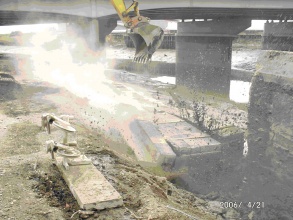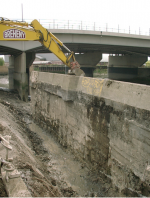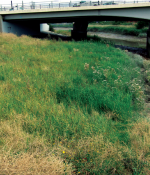Case study:Barking Creek near A13: Difference between revisions
No edit summary |
|||
| Line 1: | Line 1: | ||
{{Case study status | {{Case study status | ||
|Approval status= | |Approval status=Approved | ||
}} | }} | ||
{{Location | {{Location | ||
Revision as of 09:35, 19 November 2012
Project overview
| Status | Complete |
|---|---|
| Project web site | |
| Themes | Habitat and biodiversity, Social benefits |
| Country | England |
| Main contact forename | Toni |
| Main contact surname | Scarr |
| Main contact user ID | User:Ascarr |
| Contact organisation | Environment Agency |
| Contact organisation web site | http://www.environment-agency.gov.uk |
| Partner organisations | |
| Parent multi-site project | |
| This is a parent project encompassing the following projects |
No |
Project summary
Previous site use/issues
• Terrestrial habitat with rank grassland and species poor scrubland.
• Plot of adjacent to Barking Creek, accessible by informal and underused riverside footpath.
• Blind spots within site (formed by sections of redundant fencing) lead to a raised ‘fear of crime’.
• Riverside footpath not suitable for wheelchairs.
• Concrete flood defence in poor condition needing replacing.
Enhancements
• Retreat and renewal of flood defences adapting to climate change by creating increased flood storage capacity and improved riverside and intertidal habitat. Reed bunting and sand martins have been seen in this area.
• Sand martin nesting tubes.
• Improved footpath, suitable for wheelchairs.
• Blind spots remove and the site opened up although reeds allowed establish to help protect the wildlife on the river.
Monitoring surveys and results
Lessons learnt
Catchment and subcatchment
Site
| Name | Barking Creek near the A13 |
|---|---|
| WFD water body codes | |
| WFD (national) typology | intertidal |
| WFD water body name | |
| Pre-project morphology | Estuary (tidal) |
| Reference morphology | |
| Desired post project morphology | |
| Heavily modified water body | Yes |
| National/international site designation | |
| Local/regional site designations | |
| Protected species present | No |
| Invasive species present | No |
| Species of interest | |
| Dominant hydrology | Tidal |
| Dominant substrate | |
| River corridor land use | |
| Average bankfull channel width category | |
| Average bankfull channel width (m) | |
| Average bankfull channel depth category | |
| Average bankfull channel depth (m) | |
| Mean discharge category | |
| Mean annual discharge (m3/s) | |
| Average channel gradient category | |
| Average channel gradient | |
| Average unit stream power (W/m2) |
Project background
| Reach length directly affected (m) | 5050 m <br />0.05 km <br />5,000 cm <br /> |
|---|---|
| Project started | 2004/08/01 |
| Works started | |
| Works completed | |
| Project completed | 2006/03/31 |
| Total cost category | |
| Total cost (k€) | |
| Benefit to cost ratio | |
| Funding sources | Office of the Deputy Prime Minister’s (now DCLG) Sustainable Communities Fund |
Cost for project phases
| Phase | cost category | cost exact (k€) | Lead organisation | Contact forename | Contact surname |
|---|---|---|---|---|---|
| Investigation and design | |||||
| Stakeholder engagement and communication | |||||
| Works and works supervision | |||||
| Post-project management and maintenance | |||||
| Monitoring |
Reasons for river restoration
Measures
Structural measures
| |
|---|---|
| Bank/bed modifications | retreat and renewal of folld defences, construction of new intertidal area |
| Floodplain / River corridor | New footpaths, sand martin nesting tubes |
| Planform / Channel pattern | |
| Other | |
Non-structural measures
| |
| Management interventions | |
| Social measures (incl. engagement) | new walk way with disabled access |
| Other | |
Monitoring
Hydromorphological quality elements
| Element | When monitored | Type of monitoring | Control site used | Result | ||
|---|---|---|---|---|---|---|
| Before measures | After measures | Qualitative | Quantitative | |||
Biological quality elements
| Element | When monitored | Type of monitoring | Control site used | Result | ||
|---|---|---|---|---|---|---|
| Before measures | After measures | Qualitative | Quantitative | |||
Physico-chemical quality elements
| Element | When monitored | Type of monitoring | Control site used | Result | ||
|---|---|---|---|---|---|---|
| Before measures | After measures | Qualitative | Quantitative | |||
Any other monitoring, e.g. social, economic
| Element | When monitored | Type of monitoring | Control site used | Result | ||
|---|---|---|---|---|---|---|
| Before measures | After measures | Qualitative | Quantitative | |||
Monitoring documents
Image gallery
Additional documents and videos
Additional links and references
| Link | Description |
|---|
Supplementary Information
Edit Supplementary Information




